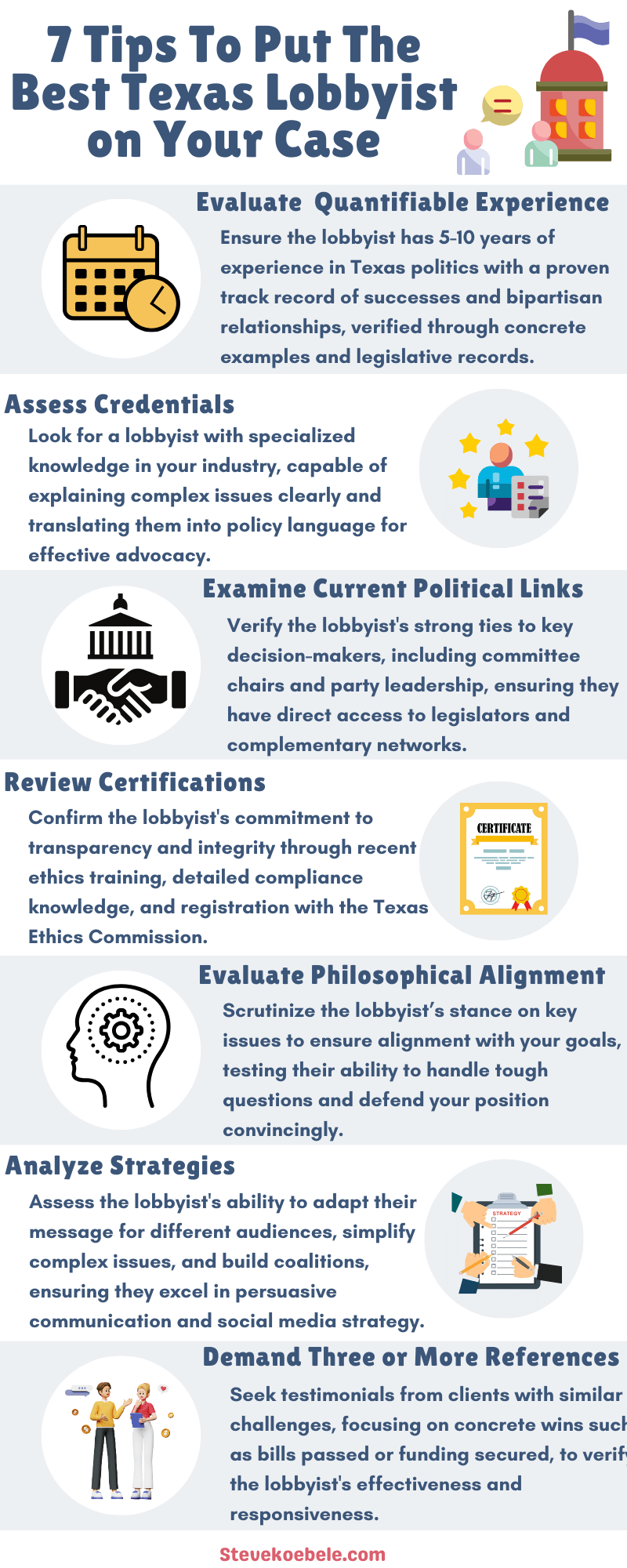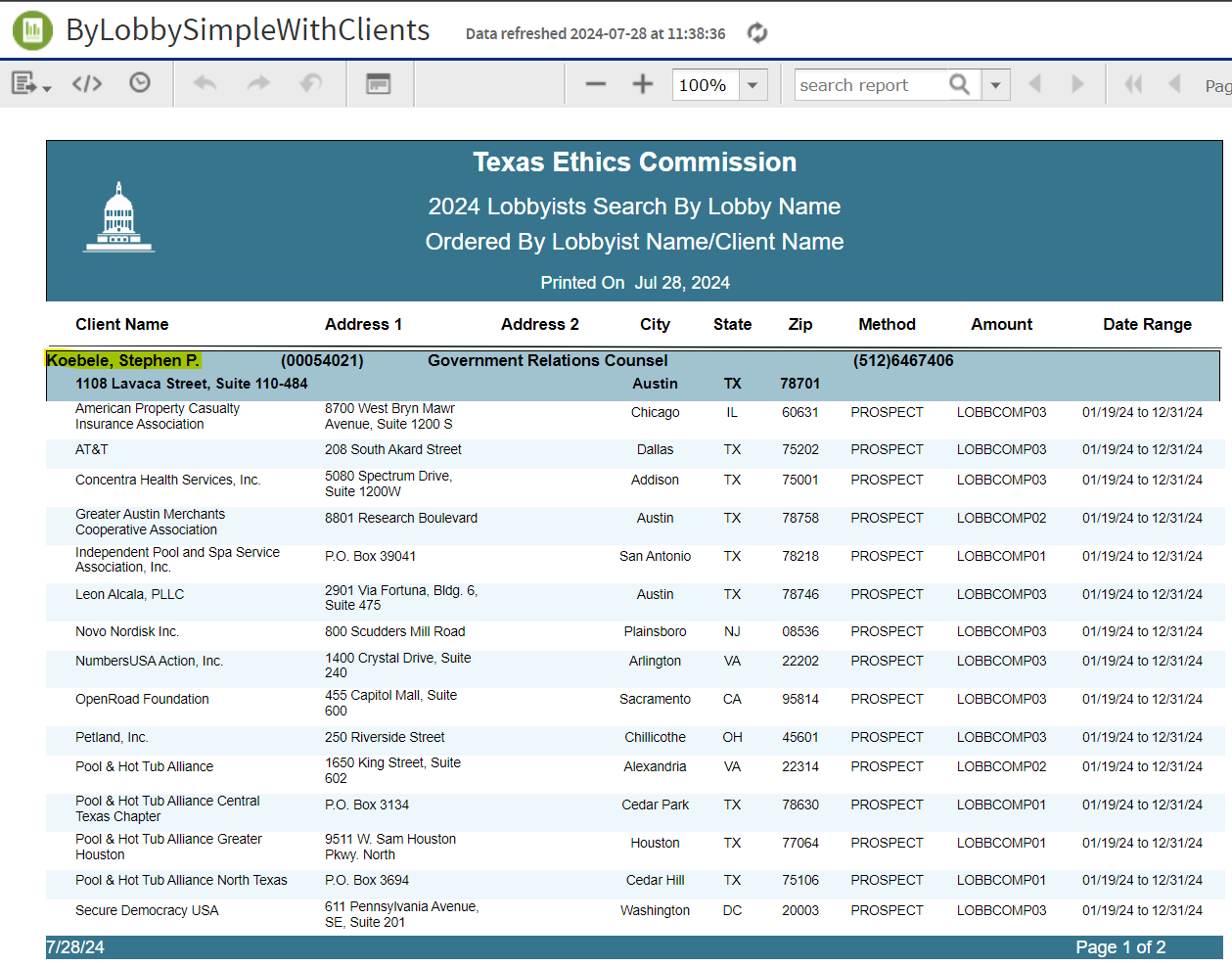
When hiring the best lobbyists in Texas, selecting representatives well-versed in the nuances of the Lone Star State's political landscape is important.
Prospective firms or individuals should demonstrate a deep understanding of the legislative process at the state capitol in Austin, as well as strong relationships across party lines.
This guide provides further insights into tips for evaluating a lobbyist's experience, focus issues, track record of success, resources, strategies, and fit for your unique public policy goals.
It’s not every day you hire a lobbyist, and the relationship with one can be extensive, depending on your issues and objectives. So make sure to follow these 7 tips below to hire the right person for your case.

You'll want a lobbyist who's weathered multiple legislative storms. The lobbyist should have at least 5-10 years of experience in Texas politics. This ensures they've built a solid network and understand what goes into lawmaking.
Ask for concrete examples of their work experience. Which bills did they champion and defeat? Verify their claims by checking legislative records. Don't hesitate to contact references.
A top-notch lobbyist maintains relationships across party lines. They've cultivated these connections during several legislative sessions. This bipartisan approach is crucial for effective advocacy.
Experience Indicator | Why It's Important |
Years in Texas politics | Deeper understanding of the political landscape |
Recent bill successes/failures | Proves current effectiveness |
Bipartisan relationships | Enables broader influence |
Your ideal lobbyist should either be a subject matter expert or have earned academic credentials demonstrating the ability to understand difficult concepts – such as a licensed attorney or academic scholar. The lobbyist must have the ability to learn and convey specialized knowledge in your industry's key areas. This expertise helps the lobbyist translate complex issues into policy language.
Test the lobbyist’s understanding by asking the individual to explain:
A top-tier lobbyist can break down complex topics for legislators. The lobbyist should articulate complicated viewpoints clearly. This skill is critical when educating lawmakers on your issues.
Your lobbyist should have strong ties to key players. This includes committee chairs and party leadership in both legislative chambers. These relationships open doors and create opportunities to advance your agenda. Ask about their regular interactions with decision-makers. Don't settle for connections to just staff members. While staff relationships are valuable, direct access to legislators is crucial.
Consider how a lobbyist's network complements your existing team. Sometimes, you need someone who fills a specific relational or political niche. This strategic approach can amplify your overall influence.
Relationship Type | Impact on Lobbying Efforts |
Committee chairs | Influence over bill hearings and votes |
Party leadership | Broader legislative strategy insights |
Complementary networks | Expands overall reach and effectiveness |
Remember, a lobbyist's relationships are a critical asset that fits with credentials. Verify their claims by asking for referrals. A well-connected advocate can significantly boost your legislative success rate.
You'll want to scrutinize your potential lobbyist's stance on key issues. Don't just scratch the surface. Dig deep. Probe their views on thorny topics tangentially related to your goals. This helps gauge their true alignment with your cause.
Role-play as a fierce opponent. Throw curveballs. See how they handle tough questions. Can they defend your position convincingly? Do they stay cool under pressure? Their responses will reveal volumes about their skills and dedication.
Remember, you're not just hiring a mouthpiece. You're choosing a partner who'll champion your cause. Make sure their heart's truly in it.
A top-notch Texas lobbyist should prioritize transparency and integrity. Ask to see proof of recent ethics training. Don't settle for vague assurances. Demand specifics about their compliance procedures.
Quiz them on gift rules and donation reporting. Their answers should be quick and confident. A true professional takes pride in their ethical standards.
Red Flags | Green Lights |
Vague responses about ethics | Detailed knowledge of regulations |
Hesitation on compliance questions | Pride in transparent practices |
Always verify their registration with the Texas Ethics Commission. Importantly, carefully evaluate any conflict of interest. Here’s what their information on file at the Texas Ethics Commission should look like:

A stellar reputation for fair play is worth its weight in gold. Choose someone who views ethics as a badge of honor, not a burden.
Present your lobbyist with tricky scenarios. Can they build bridges between opposing factions? Do they adapt their message for different audiences while remaining accurate and truthful? Look for someone who wields words like a scalpel, not a sledgehammer.
Role-play a meeting with a skeptical legislator. Observe how the lobbyist navigates the conversation and actively listens. Does the lobbyist tie the communications message to the legislative district or a constituent? Can common ground be found? A skilled lobbyist should be part diplomat, part storyteller.
The best lobbyists are chameleons, adapting their approach to each unique situation. They should excel at crafting compelling narratives that resonate with diverse stakeholders.
Don't just take the lobbyist’s word for it. Reach out to current or former clients. Ask pointed questions about the lobbyist's impact. Look for concrete wins: bills passed, financial interests protected, and harmful legislation thwarted. Confirm the Texas lobbyist’s successful wins on both offense and defense.
Seek out clients who encountered challenges similar to yours. Their experiences will give you valuable insights. A truly exceptional lobbyist should have a trail of satisfied customers singing their praises.
Questions for References | Key Metrics to Verify |
How responsive was the lobbyist? | Important bills passed and defeated |
Did they meet or exceed expectations? | Protected client financial interests |
Remember, a lobbyist's positive reputation in the Texas Capitol is crucial. The cream of the crop will have no shortage of glowing testimonials backed by hard data. Don't settle for anything less.
The cost of hiring a lobbying firm in Texas will usually range from around $20,000 for less complex matters to $400,000 for more complicated matters involving engagment with various stakeholders over a longer period. Here are some typical fee ranges lobbying clients see in Texas:
As the following table displays, the size and scope of a client also influence rates:
Client Type | Typical Fee Range |
Small Business or Non-Profit | $20,000 - $75,000 |
Mid-Sized Corporation | $75,000 - $150,000 |
Large Multinational Corporation | $150,000 - $400,000 |
Why such a stark difference? Several elements come into play. Let's break it down:
Consider a small tech startup seeking minor regulatory changes. They might pay around $30,000 for a focused, short-term campaign. In contrast, a major oil company pushing for sweeping industry reforms could easily spend $350,000 or more.
Lobbyists' expertise doesn't come cheap. Their deep understanding of Texas politics and vast networks justify their fees. They guide you through complex legislative processes, motivating lawmakers or executive branch executives in their client's favor. This specialized skill set commands a premium in the Lone Star State's corridors of power.
Remember, these figures are ballpark estimates. Moreover, some lobbyists will not work only for the duration of the 140-day Texas legislative session; they may require a contract paying compensation for a calendar year or longer. Actual costs can vary due to specific circumstances. Some firms offer tiered pricing structures, while others negotiate custom packages. It's crucial for businesses to clearly define their objectives before approaching a lobbyist for potential engagement.
Ultimately, the investment in lobbying often pays off. Companies view these expenses as necessary for protecting their interests and shaping favorable policies. In Texas' political arena, skilled and successful lobbyists can be worth their weight in gold – or rather, in Texas, barrels of oil.
When determining whether to hire an individual lobbyist or a lobbying firm, consider the level of attention and support resources that will best suit your needs. Some lobbyists are one-person shops – a Hired Gun Lobbyist – who should be able show you how your Texas lobbyist needs will be met under time limitations. You can scale up by engaging multiple Hired Guns. Larger firms employ many professionals and analysts that work their core competence.
Option | Pros | Cons |
Individual lobbyist | Personalized service Direct line of access | Limited time/resources No backup support |
Lobbying firm | Large team and research resources Team support | Less personal attention Higher costs |
As the table shows, an individual lobbyist may be best for clients wanting close personal involvement, while a full-service firm provides more support options but at the cost of personalized attention. If you are considering a seasoned Hired Gun Lobbyist, ask that lobbyist for case examples showing how that individual successfully defeated a multi-person lobby firm. Consider your budget and needs to find the right balance.
When vetting potential lobbyists, it can be easy to gravitate toward the ones with which personally connect. However, having a good rapport is only one part of the equation - you must also thoroughly assess their record of substantive experience, tactical strength, and strategic planning abilities.
Some key questions to ask lobbyists during the selection process include:
While likeability matters, ultimately, you are hiring the lobbyist for professional expertise, not their personal charm. Don't neglect substantive vetting, no matter how affable a lobbyist seems.
When formalizing any lobbying contract, establish clear guidelines for handling any dispute regarding recommendations, budgets, expenditures, tactics, or strategy. Even with the best lobbyists, disagreements might occur as situations evolve.
Some collaborative approaches include:
Laying this groundwork upfront empowers an honest work dynamic where both client and lobbyist feel comfortable voicing perspectives. It also mitigates potential future frustrations from ambiguous decision rights.
Beyond general duties and compensation terms, contracts with lobbyists should precisely define the intended scope of representation and allow for orderly termination under certain scenarios. Conflicts of interest should also be addressed. Some suggestions:
The State of Texas statutorily mandates compliance with the provisions of Government Code section 305.028, relating to conflicts of interest. Comprehensive contracts establish clear expectations upfront and prevent messy disputes later. Clients can customize agreements to their unique circumstances by closely reviewing the boilerplate language.
Here are some practical things you can do to build a long-term relationship with your Texas lobbyist after hiring the individual or firm:
Communicate regularly | Schedule timely 15-minute phone check-ins and email regularly to discuss public policy developments, advocacy needs, and opportunities/challenges. This ensures your lobbyist is updated and fully engaged. |
Provide background materials | Give your lobbyist your annual report, issue briefs outlining policy positions, a five-year strategic plan, and an updated fact sheet on your industry/issues. This gives the lobbyist important context and forethought. |
During the legislative interim period:
Additionally, assign a dedicated Government Affairs contact as the point person. Including your lobbyist in strategic discussions helps them understand the client long-term vision.
To further align your goals, you might also sponsor industry events or contribute to causes they support. Beyond a mere hired gun, the lobbyist is your eyes and ears in the Capitol and your voice in the halls of power.
One lobbyist who exemplifies the qualities of an exceptional advocate is Steve Koebele. With more than 33 years of experience navigating the Texas political and public policy landscape, Steve Koebele has demonstrated time and again his ability to achieve real results for clients.
Achieving numerous legislative wins for small, big, and Fortune 500 businesses and a deep well of bipartisan relationships, Steve Koebele brings the necessary resources and a strategic approach perfected over decades.
For any advocacy group or business seeking to further their priorities at the state level, hiring Steve Koebele provides a powerful champion with unmatched skills, comprehension of the process in the Texas Capitol, and contacts who can move policy goals successfully across the finish line.